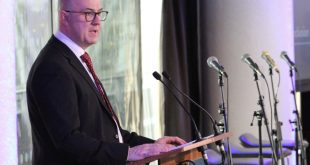The UK Gambling Commission (UKGC) has been cooperating with the government on the Gambling Act review White Paper, but cannot pre-empt what the White Paper will entail.
These were the words of UKGC CEO Andrew Rhodes, speaking to Racing TV via video link, where he was quizzed about the potential outcomes of the review and the dynamics on affordability checks.
The White Paper – a regulator’s perspective
After nearly two and a half years in development, the review has once again been delayed following a change in departmental structure and oversight at the DCMS, but according to Rhodes one thing is clear – the government is determined to act.
He informed Racing TV’s ‘Luck on Sunday’: “We’ve obviously been talking to the government throughout the development of the White Paper. The government has made clear that it thinks something needs to happen in this space.
“The Betting and Gaming Council’s Chair has previously said, I think it was in the House of Lords, that something needs to happen in this space. There are lots of people who said that we can’t carry on with the sorts of cases that we’ve seen.”
The cases Rhodes was referring to, he detailed earlier in the discussion, were examples of bettors losing far more than they were capable of affording, asserting that this was ‘not a moral judgement on what people should spend their money on’.
As the UKGC CEO put it, the focus is on customers who have been losing £245,000 when they only earn £30,000, or who have spent £70,000 in the space of 10 hours.
Numerous examples of this last were the reasons for a plethora of regulatory penalties issued by the UKGC to a range of operators, with some notable names being Entain, Sky Bet and BetVictor.
Rhodes added: “We have to guard against that and that’s a part of our obligations, and that’s really where we want industry to be focused – making sure that they are reducing the level of risk for consumers in that area.”
Regarding the UKGC’s role in the White Paper’s formulation, Rhodes outlined that the regulator has been to contribute evidence, statistics research and detailed analysis to inform decision making.
This has included data on player behaviour and rates of harm, with the latest UKGC figures putting problem gambling rates at 0.2%.
However, the CEO informed Racing TV that the gambling harm rate for online players stands at ‘a little under 10%’ due to the larger volume of customers and stakes.
“The reality is there are risks that are present in the industry now that need to be addressed and that’s what we’ve been focused on,” Rhodes emphasised.
“As I said, it’s in that range of customers that are experiencing harm or are likely to and it’s the sort of extreme cases that we’ve been drawing attention to during the last few years.”
Addressing affordability
As the Racing TV host noted, affordability checks have been a recurring topic of debate throughout the Gambling Act review, and have been of particular concern for some horse racing stakeholders.
As racing relies heavily on betting as a source of income, predominantly through an operator levy and media rights payments, some with an interest in the sport have raised worries about the subsequent impact affordability checks could have on this attempt to manage player expenditure.
Rhodes, however, argued that there has been an ‘awful lot of misinformation and misunderstanding’, largely due to the topic of gambling often being an ‘emotional’ one for many people.
“We haven’t mandated affordability checks,” he continued. “What we’ve said to the industry as you have to make sure that you have policies and procedures in place that guard against risk for consumers.
“For all operators, this is a requirement that they have to have. They have to meet that requirement. We’ve not specified that it must be at pounds level. We’ve not specified what proportion of people’s income, they’re allowed to gamble.
“What we’ve tried to do is offer advice on different things the industry might consider that they have to remember each operator is also different.”
During his speech at ICE London last week, Rhodes stated that participation in gambling over the last four weeks was ‘statistically sable at 44%’, and that the level of online betting had ’continued its long-term trend’ up to 27% – a figure matched by the land-based sector.
The UK is host to one of the world’s largest online gambling markets, catering to a customer base of over 22.5 million and generating £14.1bn in gross gambling yield between April 2021 and March 2022.
There are therefore a range of operators catering to an equally diverse range of customers, with Rhodes observing that some may have ‘high volume, low spend’, whilst others have few bettors who spend higher amounts.
As long as operators have the right procedures and processes in place to safeguard customers, whether high spending or low spending, then there is no issue, Rhodes asserted.
He did note, however, risks vary from sector to sector, observing that the impact of and rationale behind affordability checks does not just apply to horse racing, due to the multi-product nature of the industry.
Additionally, he asserted that ‘there is no doubt that the income into racing has fallen’, there have been ‘four billion more bets placed amongst the largest operators and four million more active accounts, but we have seen active losses go down’.
“We’ve definitely seen some adjustment, but I don’t think the evidence exists to pin something on one specific factor. There are always more things going on within gambling with that.”









